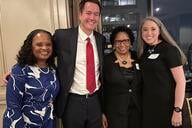You have /5 articles left.
Sign up for a free account or log in.
For more than 15 years, I have worked for start-ups and established companies at various stages of growth or pivots. I’ve been the director of marketing for a small start-up that got acquired by a larger company that ultimately went public. I’ve been a part of a division spun off to another company that later rebranded. I’ve been on the leadership team of a company that was pivoting its product offering and doubled in size in a year.
At most of these companies, there was a common theme of challenges: a lack of resources for marketing.
This isn’t a shocking discovery. Nearly every marketing leader at every company in the history of companies has complained about needing more resources for marketing. However, one of the key items that is missed in higher education is the lack of resources over all. Once these institutions are done paying their head of marketing, they simply don’t have the resources to invest in any of the strategies they want to implement. That’s where fractional CMOs come in.
I learned about the concept of a fractional CMO, fittingly enough, from a well-targeted Facebook ad. The idea is that as a senior level marketer, you are able to bring ideas, direction and strategy to the table. Then you delegate the rest to internal resources (the junior-level marketers that the company typically employs) or a network of freelancers.
Doing this on a fractional basis, on retainer or for a mutually agreed-upon set of hours per month, enables the company to invest less in marketing leadership. Instead, it reserves those funds to actually invest in the marketing strategies and the junior-level staff focused on execution.
What could this mean for higher ed as a whole?
Last year, shortly after starting my business, I joined the Enrollify podcast to discuss the future of marketing leadership for higher education. At the time I felt like the vendor/service provider side was well suited to jump on this trend quickly. The allure of bringing in top marketing talent (of which there is an abundance!)—without the strain of the full-time salary, benefits and equity that comes with it—is tempting. Additionally, it insulates the company from needing to evaluate their full-time resources when an inevitable soft sales quarter comes.
The great resignation and quiet quitting have impacted higher education institutions greatly. Thankfully, vendors and service providers have been here to keep many of the talented people leaving institutions in the higher education community—just on the other side of the desk.
Regardless of where your CMO sits, that person is capable of adding value in many ways, including:
- Strategic direction and prioritization
- Content ideas and production (when expertise allows)
- Analysis of outcomes and strategic decision-making
- Remote team leadership and management
How can colleges and universities leverage a fractional CMO?
My prediction has been that higher education institutions will be slower to adapt the model of a fractional CMO than their vendor counterparts. The reality is that the COVID-19 pandemic has proven that institutions tend to overemphasize the value of in-office presence for their teams, at the expense of talent.
This is not to say that higher education institutions shouldn’t try to employ some of this approach. Budget strains will require colleges and universities to be creative with their financial resources to stay afloat. In fact, there are glimmers of brilliance. On a recent episode of the FYI podcast, Stephanie Geyer shared some of her experience serving in a marketing leadership role for the University of Montana remotely from Colorado. Stephanie is an example of how institutions who are willing to think outside of the box can find and utilize talent in ways that moves them forward strategically.
Ultimately, the solution is simple: embrace remote work and focus on the right person for the job regardless of where they are physically located. In the right situation, a fractional CMO can help you further your brand, grow demand and ultimately drive revenue at a fraction of the total cost of a full-time hire.




